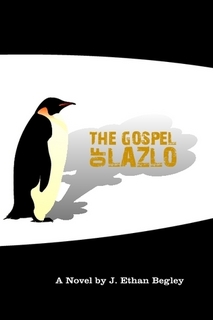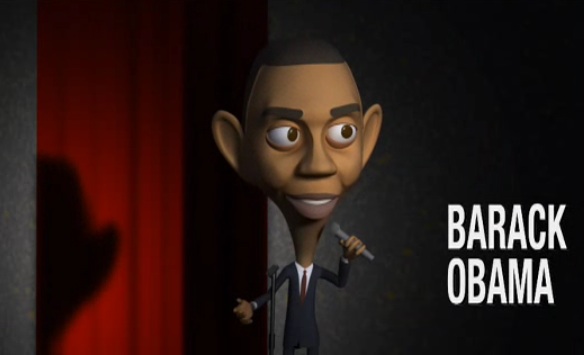
Wake Up!!
“Strip away the penguin bombers, kung-fu gothic clowns, and underground cafe societies and what you have left is a boy and a girl…” ~Jeff Begley – Author of The Gospel of Lazlo
I delightedly received an advance [reviewer’s] copy of a new book, and was of course asked to review… the… book. The fact that I don’t know the first thing about writing a review didn’t deter me – I like books, what could go wrong? I figured, like the seven words you can’t say on TV, I’d find a “what not to say” list and muddle my way through. Here’s Carlin’s list:
[Everybody knows these seven cuss words, if not, follow the link] Those are the heavy seven. Those are the ones that’ll infect your soul, curve your spine, and keep the country from winning the war.
Wow, pretty easy. Certain that the “thou shalt nots” were fewer and easier than the “thou shalts,” I found my list of “don’t words” on the New York Times:
“Poignant, compelling, intriguing, eschew, craft, muse, and lyrical” [those are the heavy seven. The ones…] It’s possible to (mis)use all seven words in a one-sentence book report: “Mario Puzo’s intriguing novel eschews the lyrical as the author instead crafts a poignant tale of family life and muses on the compelling doings of the Mob.”
At this point I knew I was screwed. I should have mentioned the title and author’s name right up front – oh wait, I did! While I still think I’m screwed here, let me tell you why the book is a must read without the above words… on the second list. So pretend this next paragraph is the first 😉
Jeff Begley’s freshman novel, The Gospel of Lazlo catches the reader by the throat up front and promptly throws him into the company of Lazlo, our protagonist and primary narrator. The details throughout are as real, graphic and gritty as the characters in this thrust at the fringes of dystopian cyberpunk. I say the fringes because, like the opening quote, it’s more than cyberpunk – it’s got a romance of the best sort, the kind that happens while you’re busy getting on with life. More on the romance later – I like the religion, sex, and politics!
The book is about an out of work, homeless, skeptic of a journalist named Lazlo Epps. Though initially stumbling his way through the process of living, he manages to stumble into both a bit of journalistic work and a home. The stumbling continues as Lazlo finds himself making choices that disquiet both he and the reader and put him in the middle of a cultural rebellion. The story is well plotted and spends more time on narrative (action and storytelling) craft (oh shit, I’ve used two of the forbidden words) than description or exposition.
Begley, like Richard Bach in Illusions – The Adventures of a Reluctant Messiah, leads us to the problems between perceptions and reality and the contingencies involved with individual experience. Again, it’s graphic, gritty, and to the point. Where Bach leads us gently, “Perspective – Use It or Lose It. If you turned to this page, you’re forgetting that what is going on around you is not reality. Think about that –” Begley grabs us by the short and curlies and shakes us where we live and lets us know “It’s horrifying how the lens of your life can change with a single event.” This lens shifting is a recurrent theme that is put to excellent use and is introduced early with Lazlo’s recounting of his divorce. The perceptual shifts, the accretions of gradual and sometimes horrifyingly abrupt curtain lifting, cause us to share the lens shifts experienced by Begley’s well formed characters.
For example, Lazlo is involved in a “reconditioning service” specializing in cleaning up after suicides, murders, etc. Describing the lens shift suffered by the clients availing themselves of this “reconditioning service” Lazlo graphically shows us:
For the customers of Discrete Reconditioning Services this was also the case. Before they required our help, their home was a sanctuary, their default location, and a safe haven. After their loved one bled out in the bathtub or ate some buckshot, their home was a tragic site. Their default location became their cars or any public place they could sit and avoid their house. Their safe haven was the source of their insecurities, fears, and pathos.
Their promise of a father or husband replaced with a crime scene. Their sanctuary, a forensics exhibit.
When his daughter is graduating from high school and she thinks how much she wished her father was there, she’ll have a moment where she remembers his head broken apart in the bathroom. When his widow makes the final payment on their house, she’ll feel the irresistible need to go look at the toilet where they found her husband. She’ll remember all the invented fictions of their retirement before it happened, two old lovers working a garden into their twilight, and in the middle will be her husband sitting in front of a wall turned into a semi-truck mud flap for brains.
This particular day, we were working for the Army on a “rapid, wide-effect cranial evacuation,” DRS lingo for a head blown all over the wall. To tell the truth, most of our work was military. Channy sat on a barstool that looked like a giant yellow suction cup for his ass. This was a Sergeant Major’s house.
Lens shift.
Discussing his friend Channy’s lens shift, Lazlo relates the old aphorism that there are no atheists in foxholes. Begley manages to put a wry smile on our faces while still maintaining a firm grip on our throats:
But there’s nothing natural about having the upper left quadrant of your skull shaved off with a bullet. Nothing natural about a tipped over baby carriage exploding next to your truck sending scraps of metal and screws into your belly and pelvis. That type of stuff makes it hard to be an atheist.
I didn’t really know that Channy was an atheist.
In Bosnia I was Catholic.
Channy never really talked about God or an afterlife or anything, other than to criticize religion. For all I knew he was Wiccan.
In Kosovo I was Buddhist.
Now here’s the hard part… how do I keep going without giving up the story? Do I tell you the obvious? Life isn’t a fairy tale. That it’s important to take the time to look behind the curtains as best we’re able? Life has good things for us too. Like that romance stuff I said I’d return to later… There’s this girl named Sophie…
“Alright, Mr. Epps. Do you want me to be in your fairy tale?”
Could I handle a woman who might catch glimpses of my mind through passwords when I didn’t want her to? I wasn’t sure. But that wasn’t what she was offering. She was offering to catch those glimpses and then let them go. I didn’t think it would work, but if I didn’t say ‘yes’ I’d regret within moments not knowing for sure.
“Yeah, I want that kind of fairy tale.”
Sophie winked at me and half-smiled. “Then the last two hours never happened.”
“Just like that?” I asked.
“Yeah,” she said, “Just like that.”
Something made me believe. Big eyes and a pair of breasts could get me to believe a lot, but this was different.
…Sophie made her whippet-sniffing grin permanent; it was carved into her face and wasn’t going away. I shrugged off my seatbelt and climbed into the back seat with her. I didn’t want the distraction of Mack. The hardest part of being a romantic is other guys watching.
So then, I’ll give you some privacy to pick up a great little novel that pushes a few boundaries, conjures up notions of spiritual growth without being religious, and provides transformations as stunning as Neo in the Matrix or Bach’s reluctant messiah. As soon as it’s available, I’ll remind you and post a link for the purchase HERE at my site!
Update: Also available here! and here!
Like this:
Like Loading...















